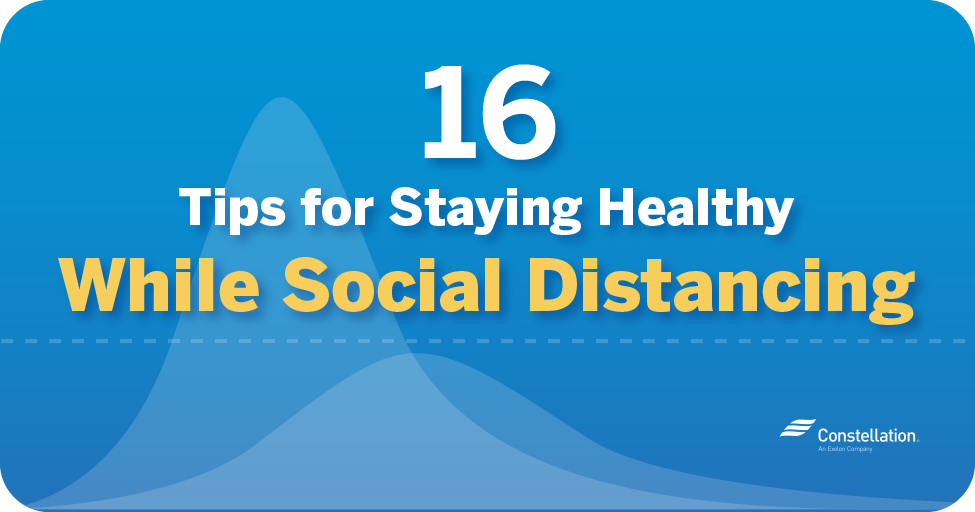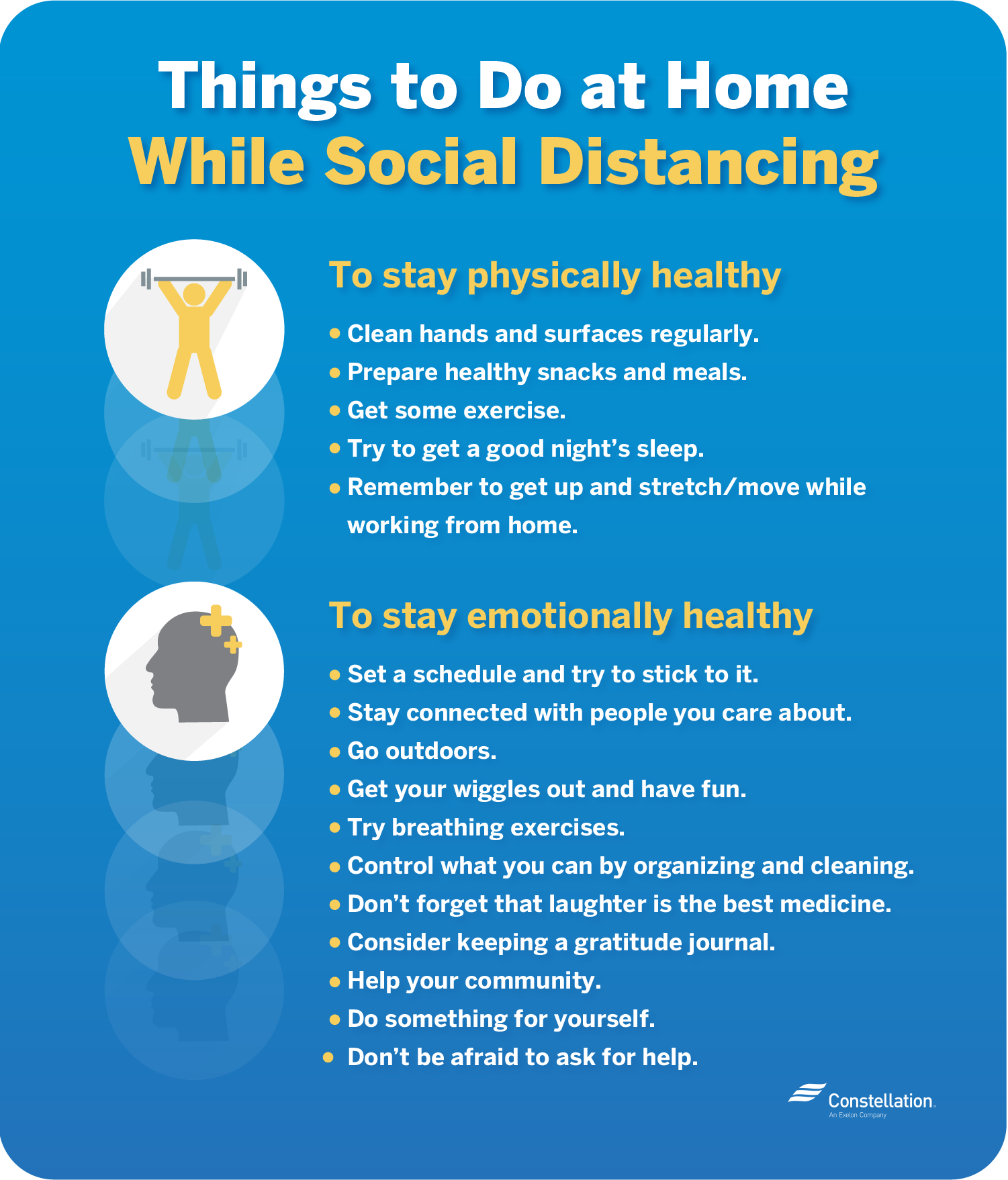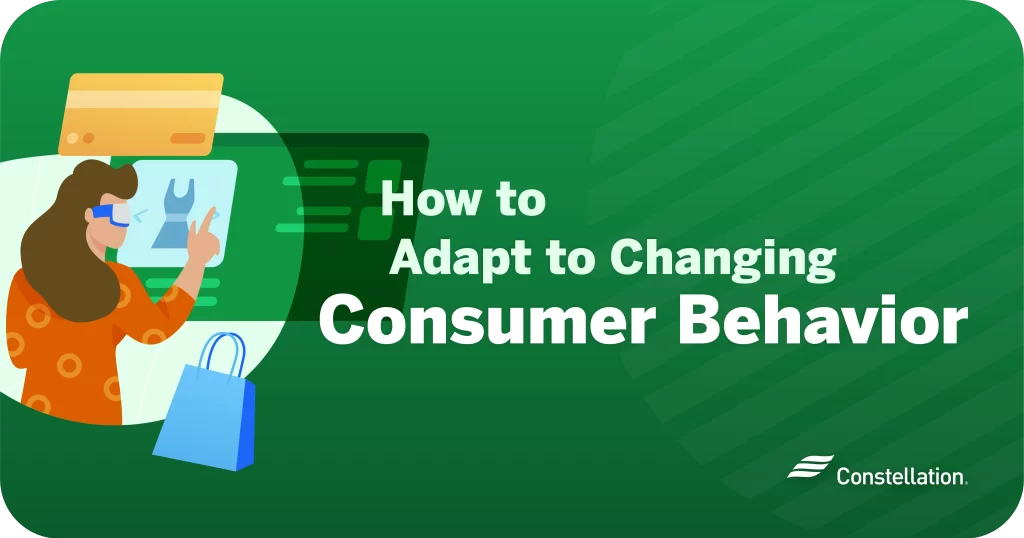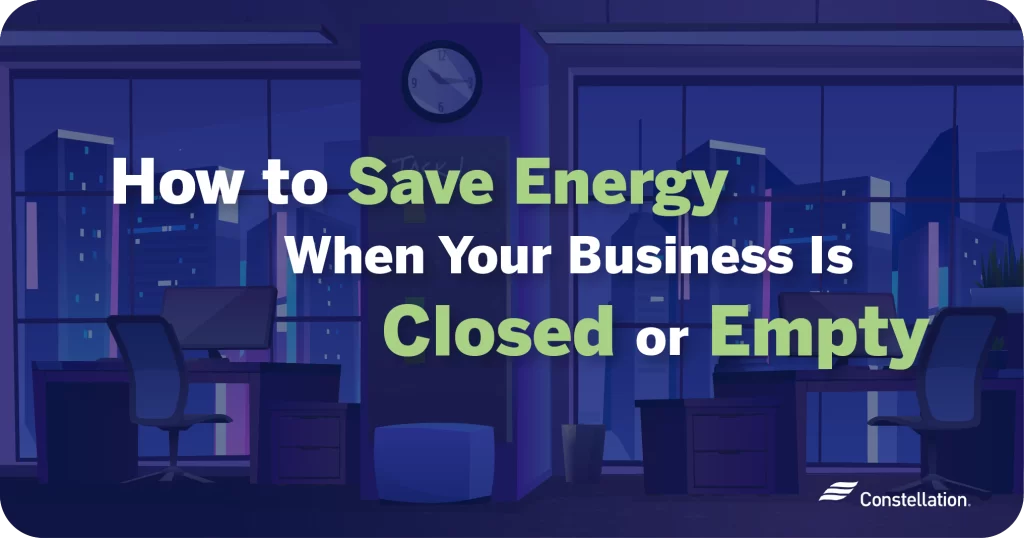
- Category:
Disaster Preparedness -
Last updated:
July 28, 2022
16 Tips for Staying Healthy While Social Distancing at Home
We’ve created this list of tips to help you stay mentally, emotionally and physically healthy while social distancing during the COVID-19 spread.
“Social distancing” is a term that has taken over the media and our lives recently. Social distancing measures include canceling sports events, festivals, vacations, meetings and even everyday work and school. When everything fun and interesting has been canceled and you can no longer see even your closest friends or colleagues, it’s easy to feel isolated and anxious. Staying healthy and happy while contact with others is limited will help you and your loved ones get through an extended period of isolation.
What is social distancing?
Social distancing is the practice of physically distancing yourself from others to slow the spread of viruses like COVID-19 and the flu. Keeping 6 feet away from other people reduces your risk of catching a disease or spreading it to others.
States have implemented social distancing measures like sheltering in place or staying at home, and have recommended self-isolation or quarantine, depending on a person’s level of exposure or a potential diagnosis. This has resulted in many business and school closures, event or group cancellations, and reductions in public transportation and services.
Why is it so important to limit how much we go out in public right now?
We have no vaccine for COVID-19 and no proven treatments yet. We’re not certain how or when a person can spread the disease. And there’s evidence to indicate that infected people with no symptoms can spread the virus. Because COVID-19 can be deadly, the best way we can save lives right now is by limiting contact between people.
Things You Can Do to Improve Your Health and Happiness While Social Distancing
While following social distancing strategies can help keep you safe from COVID-19, they can also be damaging to your health and happiness. Strained relationships, loneliness, boredom, anxiety and a feeling of wasted time can increase every day you spend practicing safe social distancing measures. While isolated with limited resources, you may also find yourself neglecting a proper diet, exercise and good hygiene.

How to stay physically healthy during COVID-19 social distancing and isolation
It’s so important to stay physically and emotionally healthy right now. By remaining healthy, we reduce the spread of COVID-19 and help to “flatten the curve” by not contributing to more positive cases of the coronavirus. This also helps first responders, doctors and healthcare workers who are struggling to care for patients in an overloaded healthcare system.
Here are ways you can stay physically healthy while sheltering at home:
- Clean your hands and frequently used surfaces often. According to
CDC guidelines, washing your hands and disinfecting surfaces is the single most important thing you can do to prevent the spread of disease. Scrub thoroughly for at least 20 seconds with soap and water before you go out and again when you return home. Wipe surfaces regularly with antimicrobial cleaners. - Prepare healthy snacks and meals. Do your best to eat well. That means favoring foods that are nutrient-rich, like fresh fruits and vegetables. Take a moment to visit the USDA’s ChooseMyPlate.gov site to get the latest information on healthy eating — or download the app. It’s easy during times of stress when our schedules are upended to fall into bad eating habits like skipping meals and loading up on junk food. Of course, everyone is allowed an occasional cheat day, but healthy eating will make you and your family feel better in the long run.
- Get some exercise. You can still go outside while social distancing. As long as you maintain a distance of 6 feet from others, going for a walk is very good for you. A change of scenery, fresh air and vitamin-rich sunshine is key to your mental and your physical health. And when you’re inside, the internet offers a huge selection of at-home workout and health routines, from yoga to kickboxing.
- Try to get a good night’s sleep. Sleep can be another victim of an upset schedule. You might find yourself mindlessly binge-watching television into the wee hours. Save some energy and preserve healthy sleep rhythms by turning off your television and other electronics at a set time every night. In fact, consider going to sleep an hour earlier than you usually do. Extra sleep is a huge boost to your immune system, helps maintain a healthy body weight, offers cardiac benefits and is key to avoiding depression and anxiety.
- Remember to get up and stretch/move while working from home. If you’re working from home, you may find yourself sitting for long periods of time. You can improve your focus and productivity, and stay physically healthy, by taking hourly movement breaks. Stop and do some basic stretches, situps, pushups, squats or a few yoga poses. Sitting for long periods of time can lead to chronic back and neck pain.
How to manage your emotional and mental health while social distancing during COVID-19
Social distancing, coupled with a steady stream of alarming news stories or limited resources and income, can fray your emotional and mental health. Anxiety, insomnia, emotional exhaustion and feelings of despair are common.
If you’re practicing social distancing measures with family members or close friends, spending too much time together in close proximity under stress can also negatively impact your relationships. But, if you’re isolated by yourself, you can get lonely, even with frequent phone calls and video conferencing.
Here are ways you can stay mentally and emotionally healthy while sheltering at home:
- Set a schedule and try to stick to it. When the world no longer imposes a schedule on you, take matters into your own hands and establish your own routine. To the best of your ability, schedule sleep, healthy eating, interaction time and physical fitness. A routine is the best way to ensure that you maintain healthy habits. And staying healthy is important during this difficult time.
- Stay connected with people you care about. We’re lucky to live in a time where technology keeps us connected. Spend time on social media, call and text people you care about, set up online playdates. Use gaming platforms to engage in multiplayer sessions. Schedule a watching party with Netflix Party. FaceTime, Zoom and other apps make it possible to connect with loved ones face-to-face, no matter where they are physically.
- Go outdoors. It will help you get away from the same faces and give stressed relationships a rest. Consider an outside scavenger hunt or do some exercises in a secluded spot. Meet friends — at a 6-foot distance, with air hugs only — to go on a group walk. Sunshine and fresh air helps your mind as much as your body.
- Get your wiggles out and have fun. If you have kids, they might be climbing the walls by now. Throw a dance party or lead an exercise session. You can find some fun ideas at Cosmic Kids Yoga, GoNoodle or simply by searching “online dance classes” in your browser. Being silly and having fun together while moving can relieve boredom and stress.
- Try breathing exercises. It’s not uncommon to be unfocused or to find yourself experiencing a sudden racing heart for no reason. These are symptoms of stress you may not even be aware of feeling. Navy SEALs control anxiety through a technique called “box breathing.” Breathe in deeply for a count of four. Hold that breath in for a count of four. Slowly let the breath out for a count of four. Then keep your lungs empty for a count of four. Repeat a dozen or more times. Add box breathing to your routine, morning, noon and night. You will feel less stress, improve your focus — and help clear your lungs of stale air. That’s a good thing in a time when a respiratory virus is circulating.
- Control what you can by organizing and cleaning. It’s time for spring-cleaning. Being stuck at home, you have few excuses to put it off. Take this time to seize control when so much in the world is beyond your influence. Do a deep clean, starting in the kitchen. Cleaning the coils behind your refrigerator, pulling out and rinsing filters and removing gunk all create a healthier environment — and actually improve energy efficiency.
- Don’t forget that laughter is the best medicine. There is a line between being informed and overwhelming yourself with a flood of doom and gloom. Laughter truly is good medicine. You can increase brain serotonin levels and boost your immune system by scheduling time to laugh with friends or enjoy a comedy show.
- Consider keeping a gratitude journal. Like laughter, gratitude can help you stay balanced and grounded. Keep a journal of your feelings and be sure to include things that make you happy as well as things that remind you to be grateful. It’s still a beautiful world.
- Help your community. People are hurting, from elderly neighbors living alone, to stressed first responders, to small businesses on the brink of failure. Offer to help with grocery shopping for a neighbor (but wear a mask and gloves). Send thank-you notes to a hospital ambulance crew. Inquire locally about volunteer opportunities. Buy something from a local retailer for pickup later. Focusing on others relieves your stress while benefiting your community.
- Do something for yourself. Be kind to yourself. Take up a hobby you never had time for. Think about what things give you joy and work those things into your day. It might be gardening, an online painting class or reading a book you never had time for. These things help you enrich your day and recharge your spirit.
- Don’t be afraid to ask for help. It’s easy to feel overwhelmed worrying about your health, the economy, your business, your friends or even how the world is going to change. Reach out early to a therapist or clergy if you start feeling it’s all too much. An internet search will turn up resources you can access from home, often for free, including the nearest food bank, help with bills, or someone to talk to if you’re depressed and need to talk.
We are charting new territory, actually making history, with this near-national shutdown of the economy and society. It has never been done. Yet we are resilient people who have faced tough times as a country before. We can turn social distancing into a time of strengthening that will power our world back on. Constellation is proud to continue to serve our community, and we wish you and yours health and peace in this difficult time.




